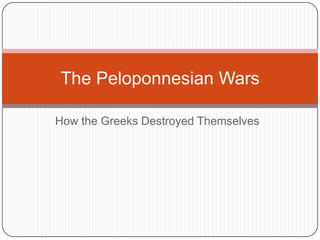
The Greeks Destroy Themselves
- 1. How the Greeks Destroyed Themselves The Peloponnesian Wars
- 2. Objectives Why/How did the Greeks embark on a self-destructive war? Did the Greeks City-States become “Empires” How was Pericles considered a “democrat”? In the end, was there really a victorious power in the Peloponnesian Wars? While one power lost, the “winning” power also failed to fill the power vacuum.
- 3. The Delian League vs. the Peloponnesian League The Delian League (Athens) Cimon’s suppression of Thasos (465 BCE) Power struggle at home: Pericles becomes leader of a faction Spartan seeks help of Athens for their rebellion The Spartans reject Cimon’s help and Ephialtes and others in Athens reconfigure power in the Areopagus First Peloponnesian War War begins with a dispute between Megara and Corinth over a boarder dispute. Megara withdrew from the 461 BCE, Cimon exiled, new policy, Athens alliance with Argos,
- 4. First Peloponnesian War Begins over boarder dispute Early Athenian advantage/ Egyptian campaign Revolt within Delian league, Truce War breaks out in Boetia and Megara opening Athens to Spartan invasion in 446 BCE. Pericles negotiates 30 year peace Divide was now distinct Sparta and its alliance on the mainland Athens and the Athenian Empire in the Aegean
- 5. Athens Builds during the truce The Athenian Empire 449 BCE/ Athens moves Delian League Treasury to Athens Expanse of Empire Change from Alliance to Empire Change due to pressure of war and rebellion and unwillingness of the allies to see to their own defense. 30 year peace is the key to prosperity and security Athenian Democracy Must view democracy in the domestic sense rather than “empire”
- 6. Athens Builds during the truce Athenian Democracy Pericles: under leadership Athens becomes freest government Opened the leadership offices: No adult male was barred from Archonship due to property. New Circuit court judges Democracy was the privilege of citizenship. Citizenship was a valuable commodity. Citizenship restricted.
- 7. Athens Builds during the truce Athenian Democracy Extent of Democracy All decisions of the state were approved by the popular assembly, not representatives Judicial decisions subject to appeal to a popular court of not fewer than 51 citizens. Main elected officials, generals, imperial treasurers, were nobles. Usually rich, but citizens could choose others Public officials were subject to scrutiny before taking office & could be called to account for actions in office and removed All citizens at the end of terms of office were held to compulsory examination and accounting. No standing army
- 8. Athens Builds during the truce Pericles Elected to Generalship for 15 years consecutively, (30 times in all) When he lost the confidence of the people they did not hesitate to removed him form office After Egyptian defeat he became more conservative Sought to retain the Aegean Empire and live at peace with the Spartans The “30 years” peace/2nd Peloponnesian War Peace lasts 445-435 BCE. Spartan Strategy: land strategy Athenian Strategy: Large income, Superior Navy
- 9. Athens Builds during the truce The 2nd Peloponnesian War Athenian Strategy: devastation of land, withhold siege Pericles exists the stage 429 BCE Peace of Nicias: 50 year peace Alcibiades: persuaded Athenians to attack Sicily 415-413BCE Power of Athens destroyed? 411 BCE survived an oligarchic coup, fleet caught napping and destroyed at Aegospotami in 405 BCE. Spartans under Lysander cut off their food supply & starved the city into submission, 404 BCE Athens surrenders unconditionally. The Great Peloponnesian War was over
- 10. Lessons of the Peloponnesian Wars Utter defeat of Athens Power Vacuum in Greek world Sparta makes mockery of Greek freedom Spartan Hubris Sparta sets up government in Athens Athens will regain some freedom under Pausanias, other than Foreign Policy
- 11. The Greeks of Asia Minor 405-404 BCE: Greek mercenaries & intervene in Persia on behalf of Cyrus the younger. (Persians were in the middle of a power struggle) Afraid of revenge, they sent to Sparta for help The Persians respond by seeking help from the cities disaffected with Spartan domination. Corinthian War (395-387) Argos, Corinth, Thebes, Athens Athens rebuilt their wall by 394 BCE This sudden reemergence alarmed Persians Spartans turned to their old ways. They disbanded all alliances, except Peloponnesian League, and put friends in power In 382 BCE, they seized Thebes without warning, and in a time of peace.
- 12. The Greeks at War with themselves Still Thebes joined forces with those who had rebelled against Sparta, 371 BCE defeated Sparta Thebians encouraged the Arcadian cities of the Peloponnesus to form a federal league and freed the Helots (helping them found their own city) Sparta was no longer able to keep and maintain an army of more than 2000, surrounded by hostile enemies, deprived of farmland and slaves, Sparta ceases to be a first rate power
- 13. The Second Athenian Empire Athens in 378 BCE attempt to rebuilt former Delian League Made promises that they would not be as they were before, only to break them when rebellion among allies breaks out. Athens did not have the power to suppress resistance as it had before. By 355 BCE Athens had to abandon most of their empire, After 2 centuries of almost continual warfare the Greeks return to the chaotic, disorganized city-states that hey were before the founding of the Peloponnesian League